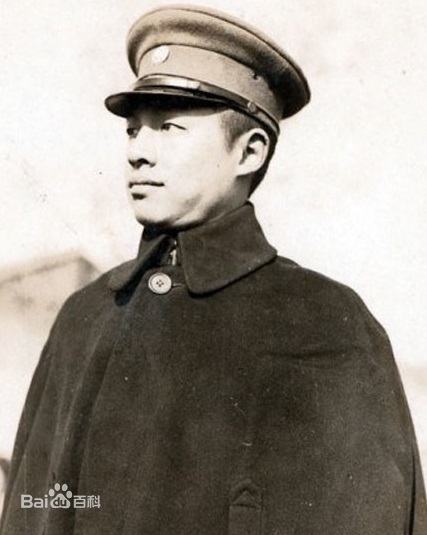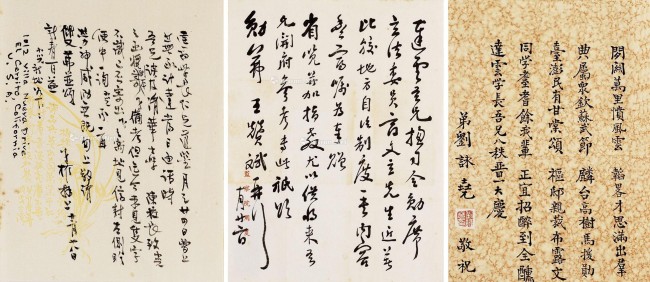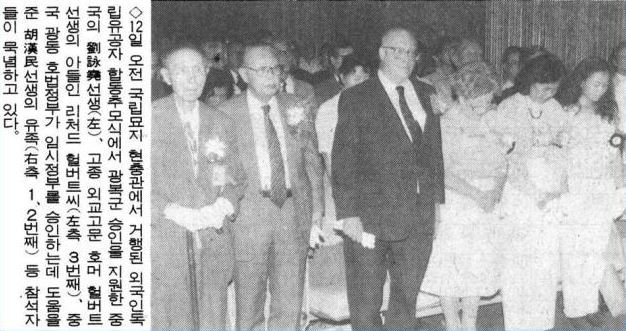[Foreigners Who Loved Korea] Liu Yongyao, Chinese general who supported Korean independence
By Korea HeraldPublished : Aug. 30, 2016 - 17:41
Liu Yongyao played many roles as a soldier, professor, and politician of the Republic of China. He helped the Provisional Government of the Republic of Korea in Chongqing receive recognition from the Nationalist government of China and actively supported the Korean independence movement in areas such as diplomacy, politics, economy, military and culture.
Building skills in the military academy
Liu Yongyao, also known by the courtesy name Zhezhi and the pen name Wukun, was born in Yaojiaga Village, in modern day Zhuzhou in Hunan province, in 1909. After attending Renlan Middle School at Qingan Township in Liling and Hunan Provincial Yueyun High School, he studied at Chaoyang University in Beijing.
He later studied at the Guangzhou Military Academy in Guangdong Province in 1923 and transferred into the first class of the Infantry Department of Whampoa Military Academy in August the following year, when the academy opened under the First United Front of the Communist Party of China (CPC) and the Kuomintang.
The Whampoa Military Academy was the culmination of the First United Front’s efforts to organize the National Revolutionary Army, the army of the Nationalists, and establish an officer training institute in Whampoa, in the suburbs of Guangzhou. The admissions criteria at the time required that the applicant be at least 18 years of age, but the 16-year-old Liu falsified his age and was admitted. He was thus the youngest student among his classmates.
The National Revolutionary Army successfully led the Northern Expedition in repulsing the warlords, first fighting those in the vicinity of Guangzhou and assimilating them into its sphere of influence. Liu received a bullet wound in 1924 during a battle to suppress the warlord Chen Jiongming, but was promoted to battalion commander for fighting courageously.
Afterwards, the Whampoa Military Academy sent the first class of its students to the Soviet Union for officer training. Liu graduated in military theory from Zhongshan University in Moscow and returned to China in 1927. Among the 20 students majoring in military theory at Zhongshan University, Deng Xiaoping was its class president, and others in the class such as Chiang Chingkuo and Dai Li would become important figures active in both the Kuomintang and CPC.
When Liu returned to China in 1927, he served as an infantry battalion colonel and then regiment commander in the National Revolutionary Army. He later became chief instructor of the Political Training Department of the Military Academy in 1928.
In 1929 after the Northern Expedition ended, he joined the Society of Practice of Three Principles of the People, or Renaissance Society (also known as the Blue Shirts Society) and became section chief of both organization and propaganda in the 4th Army’s General Command Political Department while working at each level of the Department of Political Training. In 1930, he also became the general-secretary of the Whampoa Alumni Association.
Directing the Nationalist government’s Military Committee and Military Academy
In 1931, Liu became vice director of the Bandit- Suppression Propaganda Office of the General Headquarters of the Army, Navy, and Air Force that was meant to subjugate CPC forces. In July the next year he was promoted to director of the department of political training in general Headquarters to suppress CPC forces in the Jiangxi, Guangdong, and Fujian provinces. Around this time, Liu, who had established the Angry Tide Studio, published the Clean-Up Daily. In 1931 he became chief director of the Department of Political Training in the Training Commission of the Nationalist’s Military Affairs Committee and in the following year he served as general secretary of the Society of Practice of the Three Principles of the People or BSS.
Building skills in the military academy
Liu Yongyao, also known by the courtesy name Zhezhi and the pen name Wukun, was born in Yaojiaga Village, in modern day Zhuzhou in Hunan province, in 1909. After attending Renlan Middle School at Qingan Township in Liling and Hunan Provincial Yueyun High School, he studied at Chaoyang University in Beijing.
He later studied at the Guangzhou Military Academy in Guangdong Province in 1923 and transferred into the first class of the Infantry Department of Whampoa Military Academy in August the following year, when the academy opened under the First United Front of the Communist Party of China (CPC) and the Kuomintang.
The Whampoa Military Academy was the culmination of the First United Front’s efforts to organize the National Revolutionary Army, the army of the Nationalists, and establish an officer training institute in Whampoa, in the suburbs of Guangzhou. The admissions criteria at the time required that the applicant be at least 18 years of age, but the 16-year-old Liu falsified his age and was admitted. He was thus the youngest student among his classmates.
The National Revolutionary Army successfully led the Northern Expedition in repulsing the warlords, first fighting those in the vicinity of Guangzhou and assimilating them into its sphere of influence. Liu received a bullet wound in 1924 during a battle to suppress the warlord Chen Jiongming, but was promoted to battalion commander for fighting courageously.
Afterwards, the Whampoa Military Academy sent the first class of its students to the Soviet Union for officer training. Liu graduated in military theory from Zhongshan University in Moscow and returned to China in 1927. Among the 20 students majoring in military theory at Zhongshan University, Deng Xiaoping was its class president, and others in the class such as Chiang Chingkuo and Dai Li would become important figures active in both the Kuomintang and CPC.
When Liu returned to China in 1927, he served as an infantry battalion colonel and then regiment commander in the National Revolutionary Army. He later became chief instructor of the Political Training Department of the Military Academy in 1928.
In 1929 after the Northern Expedition ended, he joined the Society of Practice of Three Principles of the People, or Renaissance Society (also known as the Blue Shirts Society) and became section chief of both organization and propaganda in the 4th Army’s General Command Political Department while working at each level of the Department of Political Training. In 1930, he also became the general-secretary of the Whampoa Alumni Association.
Directing the Nationalist government’s Military Committee and Military Academy
In 1931, Liu became vice director of the Bandit- Suppression Propaganda Office of the General Headquarters of the Army, Navy, and Air Force that was meant to subjugate CPC forces. In July the next year he was promoted to director of the department of political training in general Headquarters to suppress CPC forces in the Jiangxi, Guangdong, and Fujian provinces. Around this time, Liu, who had established the Angry Tide Studio, published the Clean-Up Daily. In 1931 he became chief director of the Department of Political Training in the Training Commission of the Nationalist’s Military Affairs Committee and in the following year he served as general secretary of the Society of Practice of the Three Principles of the People or BSS.

Liu, currently general-secretary of the Renaissance Society or BBS, continued his rise through the ranks, becoming concurrent vice director of the of the Board of Political Training in the Military Affairs Committee and Director of the Political Training Research Group in 1933. In April of the following year, he also served concurrently as the Chief of the Political Training Department of Central Military Academy in Nanjing and as professor at National Central University. In 1935, he became Director of the Investigation Office of Central Military University’s Alumni in the Military Affairs Committee, and then founded Xinsheng School in the capital of Nanjing. This school later changed its name to Zhongzheng School. In the same year, Liu also became chief of the 50th Division’s Political Department, chief of the National Military Academy’s Political Training Department, and chief instructor in politics. After taking office as executive director and chief secretary of the Chinese Boy Scouts, he held the First Chinese Boy Scout Parade in Nanjing in 1936 which had over 10,000 participants.
Supporting Korean Independence Movement
When the Second Sino-Japanese War broke out on July 7, 1937, Liu continued his educational activities as a professor at Hunan University while engaging in warfare as vice general commander of Hunan Province’s Anti-Japanese Self-Defense Army. After the Nationalist government moved to Chongqing, Liu restored Zhongzheng School in January 1938 and was inaugurated as its chairman and principal, as well as executive director of the China Peasant’s Bank. In May 1941, he was concurrently appointed vice director of the Nationalist Government’s Military Affairs Committee’s Political Department. At this time, Liu became friends with Kim Koo and Lee Beom-seok, strongly supporting their request for approval for forming the Korean Liberation Army and actively aiding the Korean independence movement in multiple areas such as diplomacy, politics, economy, and military. He was once threatened with being relieved of his position due to these activities.
In 1942 he became a commissioner of the Organization Committee Section in the Kuomintang’s Central Organization Department and a professor at Military Cadet Academy. In 1943 he became concurrent First Director of the Political Board in the Military Affairs Commission, and Executive Secretary of the initial Secretary Meeting of the Youth League of Three Principles of the People. In 1945, he completed his studies in the first class of the 1st rank Military General group in the Kuomintang’s Military Cadet Academy and was appointed as an army lieutenant general that same year. When the Second Sino-Japanese War ended, Liu was concurrently appointed as the director of Military Personnel Board and Vice Chief of Staff in the Ministry of National Defense in August 1946. He was elected as a representative in the constitutional convention that November. He also rebuilt Zhongzheng University in Nanjing, establishing its campuses in Hangzhou and Shanghai, and concurrently served as president.
In 1947, the year the Chinese Civil War broke out, he served as chief supervisor of the Youth League of the Three Principles of the People in Xibei, Gansu, Ningxia, Qinghai, and Xinsi Provinces as well as a member of the Kuomintang Central Executive Committee of the Youth League of the Three Principles of the People Youth Groups. A year later, he became chief of the Office of the Minister of National Defense. Afterward, he served as acting minister of National Defense in 1949 when the Nationalist Army was pushed back by the CPC in 1949 and the government moved to Guangzhou, and then he crossed over to Taiwan that December.

Political, military leader
Having situated himself in the new environment of Taiwan, Liu threw himself as a leading figure of the political and military arenas, outlined as follows:
April 1950: Army lieutenant general, strategic adviser to the presidential office building
Concurrent president of National Defense Magazine or Guofang congkan
April 1951: National Taiwan University professor
May: 3-star army general, 2nd rank general
July 1953: Chairman of the board of directors of the Taiwan Magazine Publishers Association
November: Emeritus Chairman of the Board of Directors of Chinese Poetry and Song Research Society
March 1954: Director of the USSR Study Abroad Alumni Association
July: Member of the planning committee of the Executive Yuan
October: Member of the Research and Planning Committee for Liberation of the Mainland
February 1956: Member of the Compilation Committee of History of the Political and Ideological Operations of the National Army
March: National Taiwan Normal University Professor
October 1957: Committee member of the Kuomintang Central Consultation Committee
April 1958: Member of the Historical Materials Review Committee of Academia Historica
1960: President of the Zhongzheng University Alumni Association
January 1961: Chairman of the board of directors of Hunan Province, Liling County Alumni Association
March 1963: Chairman of the board of directors of Chinese Sociologists Association
July: Executive director of Chinese-Korean Cultural-Economic Association
May 1965: Chairman of the board of directors of the Chinese-Filipino Culture and Education Association
July 1966: Member of the Constitutional Seminar Committee in the Constitutional Convention
September 1969: Director of the Chinese-France Culture-Economy Association
July 1970: Executive director of the Chinese Confucian and Mencian Theory Research Society
March 1971: Director of the Chinese Political Science Association
June 1974: Executive director of the Chinese Education Development Association
November: Director of the Promotion of Chinese Arts Association
May 1975: Chief committee member of the Chinese Military Studies Research Association
December 1980: Chief adviser to the Chinese Culture Federation
November 1981: Emeritus director of the Hong Kong Zhongzheng Daily
May 1984: Chief committee member of the Global Unity Promotion Committee

In 1990, Liu gathered Whampoa Military Academy alumni in Taiwan and organized the Whampoa Military Academy Alumni Association. Later on Aug. 6, 1993, he visited Beijing as Emeritus Director of the Visiting Group of the Chinese Peace and Unification Association, and participated in the memorial service for foreigners who contributed to the Korean independence movement at the Memorial Hall of Korea’s National Cemetery in August 1995. The Presidential Office Building of the Republic of China appointed Liu as 1st rank army general of the Republic of China and strategic adviser to the Office of the Presidential Building in 1996. After retiring as a 4-star army general, he also received the Order of Merit for National Foundation from Korea and the Presidential Medal of Freedom from the Republic of China. On Aug. 22 1998, he died in Taiwan at the age of 89.
Liu was well versed in Chinese national learning and skilled at calligraphy as well. His writings included “Party History of the Kuomintang,” “Introduction to Political Theory,” “History of Revolutions Around the World,” “General Writings on Personnel Administration,” “Theory on the Philosophy of Life,” “Introduction to Economic Theory” and “Memories at Ninety.” Open-minded by nature, Liu left behind so many poems that he was called the “Confucian General.” He was a true friend to Korea.
By Kim Jeong-hyun
Northeast Asian History Foundation
In Korea’s turbulent path toward independence and nation building, there were foreign nationals who stood steadfastly by the Korean people, although their contributions have been largely overshadowed by those of Korean patriots. The Korea Herald, in partnership with the Independence Hall of Korea, is publishing a series of articles shedding light on these foreigners, their life and legacies here. This is the 19th installment. -- Ed.
-
Articles by Korea Herald



















![[Today’s K-pop] Treasure to publish magazine for debut anniversary](http://res.heraldm.com/phpwas/restmb_idxmake.php?idx=642&simg=/content/image/2024/07/26/20240726050551_0.jpg&u=)